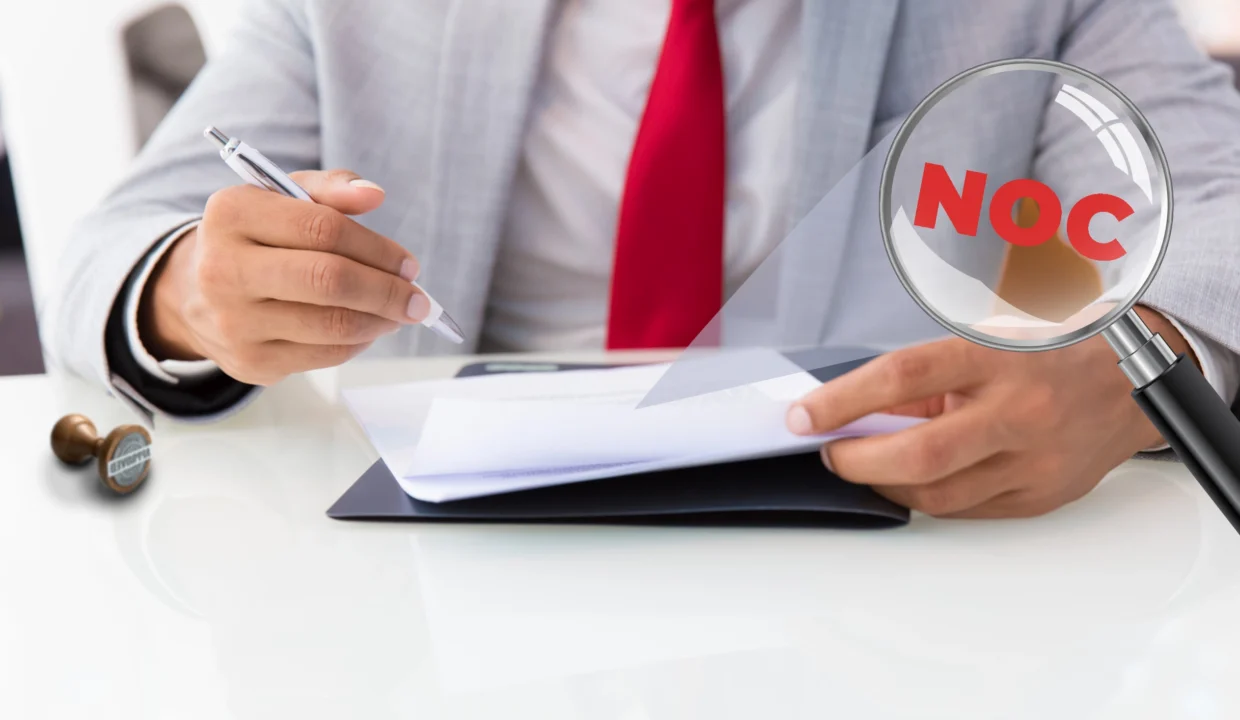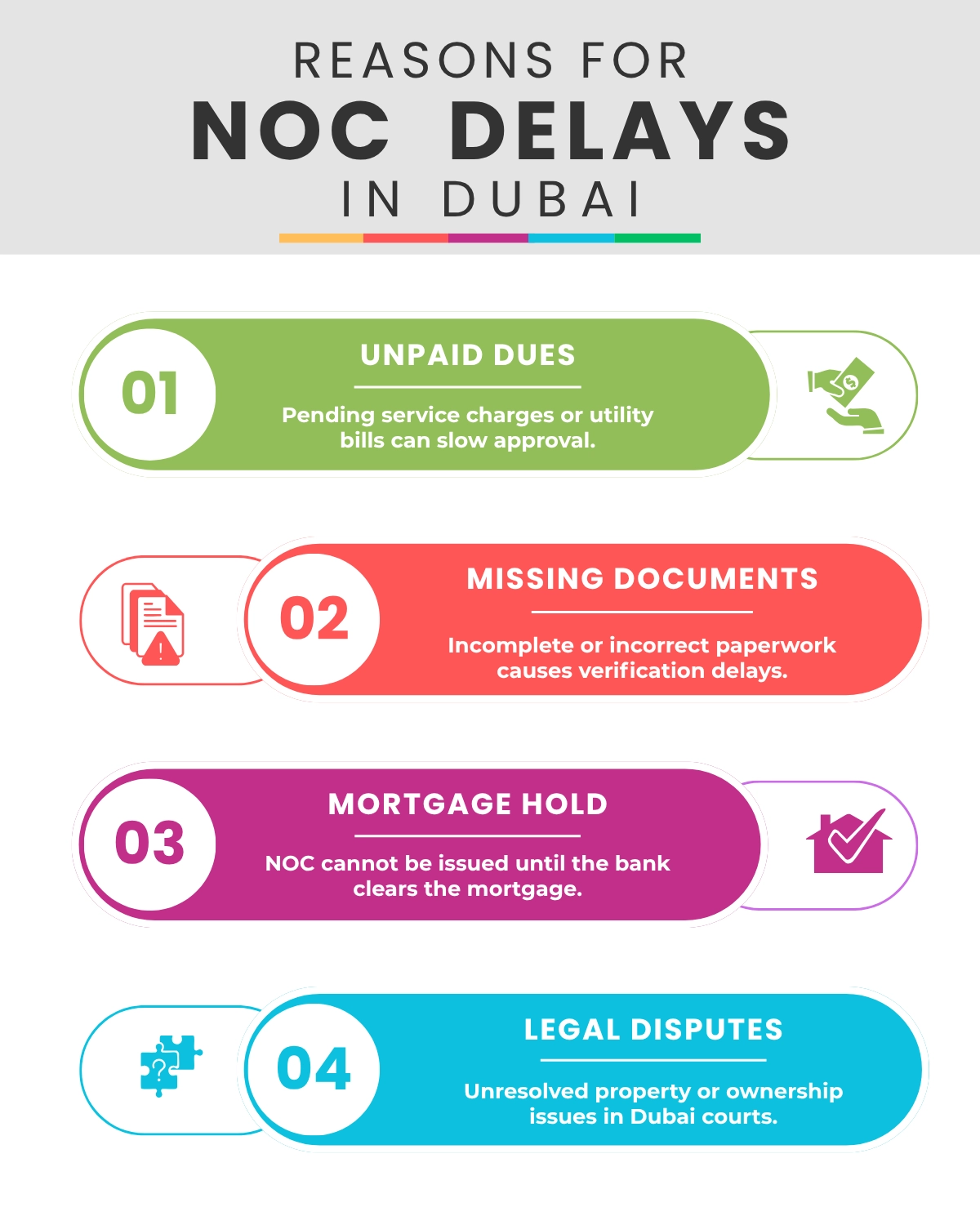
In Dubai’s dynamic real estate landscape, every property transaction must go through a series of formal steps to ensure transparency and legal compliance. One of the most important steps is obtaining a No Objection Certificate (NOC), a document that verifies a property is free from outstanding dues or disputes and ready for transfer.
In this blog, LEOS Developments guides you through what an NOC is, why it’s needed, how to obtain it, and the costs and documents involved, ensuring you navigate the process with clarity and confidence.
What Is an NOC?
A No Objection Certificate (NOC) is an official clearance issued by the property developer confirming there are no pending payments or legal issues related to a property. It’s a key requirement for ownership transfer in Dubai, assuring the Dubai Land Department that all financial obligations have been settled and that the transaction can proceed without delays.
Why Do You Need an NOC?
An NOC is essential for ensuring a smooth and legally compliant property transaction in Dubai. Here’s why it’s required:
- Mandatory for Ownership Transfer:
The Dubai Land Department (DLD) will not process property ownership transfer without an NOC. - Confirms No Outstanding Dues:
It verifies that a property seller has settled all service charges, maintenance fees, and any other financial obligations. - Shows Developer Approval:
The developer officially confirms they have no objection to the property sale or ownership transfer. - Prevents Future Disputes:
Protects buyers from inheriting pending charges or hidden liabilities. - Ensures Transparency:
Provides clarity to property buyers and supports Dubai’s regulated real estate system. - Smooth Transaction Flow:
Helps avoid delays at the DLD and ensures the process moves efficiently.
Documents Required to Obtain an NOC
Before applying for an NOC, it’s important to prepare all the required documents to ensure a smooth and quick process. Missing paperwork can delay the issuance, so make sure you have the following:
- Copies of the owner’s Passport and Emirates ID.
- Original Title Deed or Oqood Certificate (if the property is still under construction)
- A Memorandum of Understanding (MOU), also known as RERA Form F
- Proof of cleared payments, including service charges, maintenance fees, and utility bills
- No Objection Letter from the bank, if the property is mortgaged
- Completed NOC application form provided by the developer
- Power of Attorney, if someone is applying on behalf of the property owner
These documents confirm ownership, verify payments, and ensure there are no outstanding obligations before the developer issues the NOC.
How to Get an NOC in Dubai
Obtaining an NOC in Dubai is a straightforward process. Here’s how it typically works:
1. Clear all outstanding payments
Before applying, the owner must settle all service charges, maintenance fees, and utility bills related to the property. It’s important to obtain receipts or a clearance statement from the developer confirming that all dues have been paid.
2. Book an appointment with the developer
Once payments are cleared, the owner (or their agent) schedules an appointment with the property developer to initiate the NOC request. Some developers also allow online applications through their service portals.
3. Submit the required documents
The owner must provide all necessary documents, any missing document may result in issuance delays.
4. Developer review and inspection
The developer reviews the documents and checks for any pending fees or legal disputes.
5. Pay the NOC fee
After the review, the owner is required to pay the NOC fee. The amount varies depending on the developer, location, and property type.
6. Receive the NOC
Once the developer approves the request, the NOC is issued, typically within three to five working days. This certificate is then submitted to the Dubai Land Department (DLD) to complete the property transfer process.

Cost of NOC in Dubai
The cost of obtaining an NOC in Dubai varies depending on the property developer and the project. Generally, the fee is approximately AED 5,000, but it varies based on several factors, including:
Most developers require this payment to be made before issuing the NOC, and the fee is typically non-refundable. It’s advisable to confirm the exact cost with the developer in advance to avoid delays or additional charges.
Common Reasons for NOC Delays
While the NOC issuance process in Dubai is generally smooth, delays can happen due to a few common reasons:
- Outstanding payments: Unpaid service charges, maintenance fees, or utility bills are the most frequent cause of delays.
- Mortgage clearance issues: If the property is mortgaged, the NOC can’t be issued until the bank provides a release letter.
- Incomplete documents: Missing or incorrect paperwork can slow down the verification process.
- Pending disputes: Any legal or contractual disputes related to the property must be resolved before approval.
To avoid delays, ensure that all dues are cleared, documents are complete, and close contact with the developer throughout the process.
An NOC is a vital requirement for any property transfer in Dubai, confirming that all dues are cleared and no disputes exist. It ensures a smooth, transparent, and legally compliant transaction between buyer and seller.
Frequently Asked Questions About NOC
How long does it take to get an NOC in Dubai?
Usually, developers issue the NOC within three to five working days after all dues are cleared and documents are verified.
Who applies for the NOC, the property buyer or the seller?
The owner (or their authorized agent) typically applies for the NOC from the property developer before transferring ownership.
Can I apply for an NOC if the property is mortgaged?
Yes, but you’ll need a no-objection letter from the bank confirming that all mortgage obligations are met or settled.
Is the NOC fee refundable if the sale doesn’t proceed?
No, most developers charge a non-refundable fee for processing the NOC, even if the property sale is not completed.
Can I transfer ownership without an NOC?
No, the Dubai Land Department (DLD) will not process any property transfer without a valid NOC from the developer.
What happens if the NOC expires before the transfer?
You’ll need to reapply for a new NOC and may have to pay the fee again. Always complete the transfer before the expiry date.
